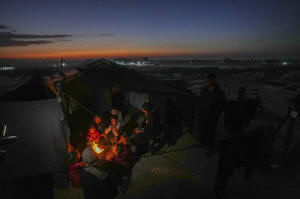Winter is hitting Gaza and many Palestinians have little protection from
the cold
 Send a link to a friend
Send a link to a friend
 [December 23, 2024]
By WAFAA SHURAFA and FATMA KHALED [December 23, 2024]
By WAFAA SHURAFA and FATMA KHALED
KHAN YOUNIS, Gaza Strip (AP) — Winter is hitting the Gaza Strip and many
of the nearly 2 million Palestinians displaced by the devastating
14-month war with Israel are struggling to protect themselves from the
wind, cold and rain.
There is a shortage of blankets and warm clothing, little wood for
fires, and the tents and patched-together tarps families are living in
have grown increasingly threadbare after months of heavy use, according
to aid workers and residents.
Shadia Aiyada, who was displaced from the southern city of Rafah to the
coastal area of Muwasi, has only one blanket and a hot water bottle to
keep her eight children from shivering inside their fragile tent.
“We get scared every time we learn from the weather forecast that rainy
and windy days are coming up because our tents are lifted with the wind.
We fear that strong windy weather would knock out our tents one day
while we’re inside,” she said.
With nighttime temperatures that can drop into the 40s (the mid-to-high
single digits Celsius), Aiyada fears that her kids will get sick without
warm clothing.

When they fled their home, her children only had their summer clothes,
she said. They have been forced to borrow some from relatives and
friends to keep warm.
The United Nations warns of people living in precarious makeshift
shelters that might not survive the winter. At least 945,000 people need
winterization supplies, which have become prohibitively expensive in
Gaza, the U.N. said in an update Tuesday. The U.N. also fears infectious
disease, which spiked last winter, will climb again amid rising
malnutrition.
The U.N. Agency for Palestinian Refugees, known as UNRWA, has been
planning all year for winter in Gaza, but the aid it was able to get
into the territory is “not even close to being enough for people,” said
Louise Wateridge, an agency spokeswoman.
UNRWA distributed 6,000 tents over the past four weeks in northern Gaza
but was unable to get them to other parts of the Strip, including areas
where there has been fighting. About 22,000 tents have been stuck in
Jordan and 600,000 blankets and 33 truckloads of mattresses have been
sitting in Egypt since the summer because the agency doesn’t have
Israeli approval or a safe route to bring them into Gaza and because it
had to prioritize desperately needed food aid, Wateridge said.
Many of the mattresses and blankets have since been looted or destroyed
by the weather and rodents, she said.
The International Rescue Committee is struggling to bring in children’s
winter clothing because there “are a lot of approvals to get from
relevant authorities,” said Dionne Wong, the organization’s deputy
director of programs for the occupied Palestinian territories.
[to top of second column]
|

Reda Abu Zarada, 50, displaced from Jabaliya in nothern Gaza, sits
by a fire with her grandchildren at a camp by the sea in Khan Younis,
Gaza Strip, Thursday, Dec. 19, 2024. (AP Photo/Abdel Kareem Hana)

“The ability for Palestinians to prepare for winter is essentially
very limited,” Wong said.
The Israeli government agency responsible for coordinating aid
shipments into Gaza said in a statement that Israel has worked for
months with international organizations to prepare Gaza for the
winter, including facilitating the shipment of heaters, warm
clothing, tents and blankets into the territory. The agency also
said Israel does not prevent the transfer of aid from Jordan.
More than 45,000 Palestinians have been killed in the war in Gaza,
according to the Gaza Health Ministry. The ministry's count doesn't
distinguish between civilians and combatants, but it has said more
than half of the fatalities are women and children. The Israeli
military says it has killed more than 17,000 militants, without
providing evidence.
The war was sparked by Hamas’ October 2023 attack on southern
Israel, where the militant group killed 1,200 people and took 250
hostages in Gaza.
Negotiators say Israel and Hamas are inching toward a ceasefire
deal, which would include a surge in aid into the territory.
For now, the winter clothing for sale in Gaza's markets is far too
expensive for most people to afford, residents and aid workers said.
Reda Abu Zarada, 50, who was displaced from northern Gaza with her
family, said the adults sleep with the children in their arms to
keep them warm inside their tent.
“Rats walk on us at night because we don’t have doors and tents are
torn. The blankets don’t keep us warm. We feel frost coming out from
the ground. We wake up freezing in the morning,” she said. “I’m
scared of waking up one day to find one of the children frozen to
death.”
On Thursday night, she fought through knee pain exacerbated by cold
weather to fry zucchini over a fire made of paper and cardboard
scraps outside their tent. She hoped the small meal would warm the
children before bed.

Omar Shabet, who is displaced from Gaza City and staying with his
three children, feared that lighting a fire outside his tent would
make his family a target for Israeli warplanes.
“We go inside our tents after sunset and don’t go out because it is
very cold and it gets colder by midnight,” he said. “My 7-year-old
daughter almost cries at night because of how cold she is.”
All contents © copyright 2024 Associated Press. All rights reserved |